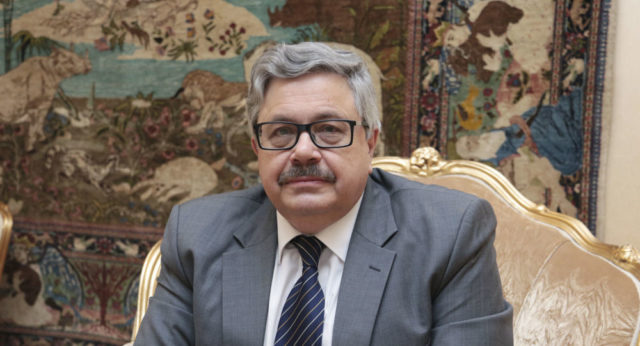
Circassians Demand Resignation of Russian Ambassador to Turkey
Publication: Eurasia Daily Monitor Volume: 17 Issue: 32
By:

The Coordinating Council of Circassian civil society organizations of Kabardino-Balkaria appealed to the head of the Russian Ministry of Foreign Affairs, Sergei Lavrov, to recall the ambassador to Turkey, Aleksei Yerkhov. In a recent interview with the Abkhazian service of Sputnik News, the Russian envoy in Ankara expressed a controversial perspective of the events of the Russian-Circassian war and the consequent 19th century deportation of Circassians to the Ottoman Empire (Sputnik News—Abkhazian service, February 13). “It is better to ease tensions among Russian and foreign Circassians that arose through the fault of a short-sighted ambassador to Turkey,” the Circassian statement says (Obzor, February 27).
Meanwhile, 11 representatives from Cherkes Fed, a coalition of Circassian organizations in Turkey, met the speaker of the Turkish parliament, Mustafa Sentop, on February 25. The Turkish Circassians handed him a petition that asks Ankara to recognize the Russian Empire’s tragic, forced deportation of the Circassian nation in 1864 as a “genocide.” In the address, the Circassian activists refer to living 156 years in exile after Russia expelled their ancestors from their homeland in the Caucasus. Their letter cites international acceptance of a “timelessness” associated with all human rights violations, and it calls on Turkey’s national legislature to discuss the official recognition of the “Circassian genocide” based on available historical documents (Cerkesfed.org, February 26).
The Circassian initiative comes at a highly sensitive moment for Russian-Turkish relations. After a period of warming ties between the two countries and their leaders, the bilateral relationship hit a low point in February over the control of Idlib province, in northern Syria. An estimated 36 Turkish soldiers were killed in what appears to be a joint Syrian-Russian military operation (see EDM, February 27). On March 1, Turkey announced a major counteroffensive against the Syrian government, practically escalating the situation to the level of interstate war (Hurriyet Daily News, March 1). Russia and Turkey have sparred over Idlib province for months (see EDM, September 5, 2019), but the situation had grown unprecedentedly tense in recent weeks. Turkish President Recep Tayyip Erdoğan and his Russian counterpart, Vladimir Putin, met in Moscow, on March 5, and agreed to new ceasefire conditions in Idlib, but questions remain about how long-term this latest pause in hostilities can last (RIA Novosti, March 5). That souring of bilateral relations presented an opportunity for Circassian activists in Turkey to advance their goals of genocide recognition that they are apparently willing to pursue.
Members of the Circassian diaspora in Turkey have criticized Ambassador Yerkhov before, when he called the deportation of Circassians from their homeland in the North Caucasus after the Russian-Circassian war a “beautiful legend.” According to the Circassian activists, such statements are offensive and an attempt to manipulate historical facts. “Circassians are a community that lived in the Northwest Caucasus for thousands of years and were noted for significant cultural achievements during this period. They lived in peace with their neighbors and for centuries resisted attacks from the north, west and east,” they said (Lenta.ru, February 18).
Yerkhov, however, has repeated the conventional view of many Russian experts, who say that the Circassians left their homeland in the Caucasus on their own and were not deported by the Russians. At the end of the Russian-Circassian war in the 19th century, the Circassians were purportedly offered the choice either to move to the plains and engage in agricultural activities or emigrate to Turkey. “Some Circassians decided to leave—and left; however, they suffered from hunger, cold and sickness both on the way to Turkey and upon their arrival. Some Circassians decided to stay—and stayed,” the Russian ambassador claimed in the above-mentioned Sputnik interview. According to Yerkhov, Circassians regularly raided Russian lands, and Russia was forced to move in to pacify them (Sputnik News—Abkhazian service, February 13).
Anachronistic and openly racist views of “Circassian savages” and the “civilizing and benign role” of imperial Russia are quite widespread in the Russian media and expert community. Apart from being morally reprehensible, such views often directly contradict facts. For example, the Russian Empire’s expansionist strategy toward the Ottoman Empire and the Black Sea region is well-documented and known. Since at least the time of Catherine the Great (Catherine II), empress of Russia from 1762 to 1796, Moscow continually attempted to destroy the Ottoman Empire, capture Istanbul and turn the Black Sea into a Russian “internal lake.” The Russian Empire’s drive to the south had nothing to do with “Circassian raids on Russian lands.” Those Circassians who happened to inhabit the coastal areas on the Black Sea were deported to the Ottoman Empire in their entirety. Russian settlers were dispatched to occupy newly captured Circassian lands mere months after the final defeat of their heretofore residents. The Circassians who lived in inland territories were partially spared. To this day, almost all Circassians in the North Caucasus live in the landlocked republics of Kabardino-Balkaria, Karachaevo-Cherkessia, and Adygea. The coastal Russian region of Krasnodar has less than half a percent of ethnic Circassians in its population of more than 5.5 million.
It is too early to say if Turkish authorities will turn a more benevolent eye to the Circassians’ aspirations in light of the tensions with Russia. And a major stumbling block would certainly be Turkey’s troubled relationship with Armenians, who agitate around the world for similar recognition of their own historical (1915) mass tragedy at the hands of the Ottomans. Still, Circassian activists have demonstrated the ability to organize for a swift reaction to attacks coming from the Russian authorities. This is likely to increase the Circassians’ overall mobilization potential for future campaigns.



